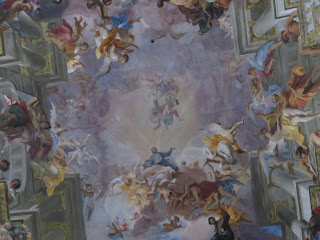La Maddalena
After Mass in the Sacristy Chapel of the Basilica of Santa Maria Sopra Minerva (Post 2) and following our visit to the Pantheon (Post 3), Day 1 of our Pilgrimage to Rome continued with a visit to the 'La Maddalena' the Church of Saint Mary Magdalene, where St. Camillus de Lellis, also a member of the Sodality of Our Lady in his time, is buried. As so often, the Church was closed but the riotous baroque facade provided some interest for our pilgrims. The site was purchased by St. Camillus and his companions in 1621, with the permission of Pope Gregory XV Ludovisi, of whom more below, and construction began ten years later. The facade was built in stages and each is attributed to a different architect. The whole effect evokes the Rococo of Borromini, with its counter-curves across the whole, although it is the only time when such effects were used so completely for a Church in Rome.
Piazza Capranica and Piazza Montecitorio
From 'La Maddalena' it is a short walk to the Piazza Capranica. We have visited the interior of the College and its Chapel in an earlier pilgrimage (here). We had already visited the Capranica Family Chapel in the Minerva (Post 3). We paused to remember Ven. Pope Pius XII, who was a student and member of the Sodality of Our Lady in the College. Taking up another side of the Piazza is Santa Maria in Aquiro. The facade is beautifully articulated in red brick and limestone. The original Church was very ancient, founded as a Diaconia, and first restored by Pope Gregory III, of whom also more later.
A few steps beyond is the Piazza of Montecitorio, with the Palazzo built by Bernini for Cardinal Ludovico Ludovisi, of whom more below, and completed by Carlo Fontana. It once housed the Law Courts of the Papal States and now houses the Italian Chamber of Deputies. The obelisk in the Piazza was brought to Rome by the Emperor Augustus and placed here by Pope Pius VI in 1789.
A few steps more is the Piazza Colonna, containing the great Column of Marcus Aurelius, which is now surmounted by a statue of St. Paul, placed there by Pope Sixtus V during the restoration of the Column as part of his magnificent town-planning project. Facing the Column across the Via del Corso is the Palazzo Chigi, built by Giacomo della Porta, and first inhabited by the family after the election of our good friend Pope Alexander VII Chigi, the first Sodalist of Our Lady to be elected Pope. The Palazzo is now the offices of the Prime Minister of Italy.
Sant'Ignazio
Turning southwards we reach the Collegio Romano - founded by our good friend Pope Gregory XIII, first Pope to approve the Sodality of Our Lady in 1584 - and the Church of Sant'Ignazio, built by Cardinal Ludovico Ludovisi, Vice Chancellor of the Holy Roman Church and nephew of Pope Gregory XV Ludovisi. Inside, in the Ludovisi Chapel to the Epistle-side of the Sanctuary, are the tombs of uncle and nephew. We have visited the Church on several previous pilgrimages (here) because this is the site of the first Sodality of Our Lady, the Prima Primaria. In previous years we have visited the Chapel of the Prima Primaria and the rooms once occupied by Saints Aloysius Gonzaga and John Berchmans, both Sodalists (here) but confined ourselves on this visit to the Church, which contains the relics of both Saints as well as the relics of Saint Robert Bellarmine, Professor and Rector of the College.
Let us remember particularly Vittoria della Tolfa, Marchese della Valle, who donated the entire block to the Jesuits to found the College and Church. The Church itself is the second on the site, the first dedicated to the Annunciation, a dedication that was perpetuated in the Prima Primaria. Pope Gregory XV had been a student of the College and had canonized St. Ignatius in 1622. Cardinal Ludovisi patronized the project. the foundation stone was laid in 1627 and the whole building was complete in 1685.



























